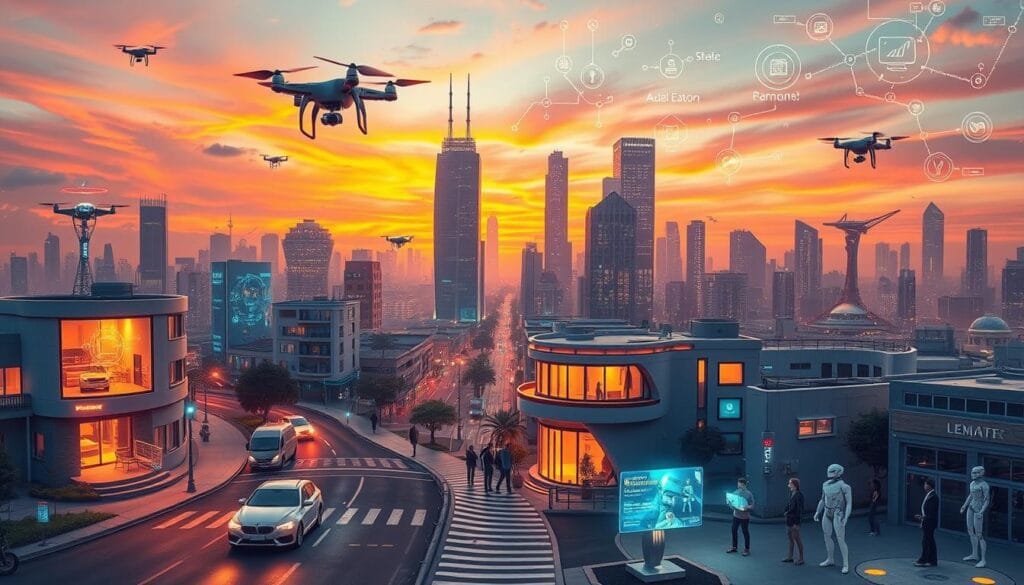Artificial Intelligence Important in Our Life Today
Artificial intelligence (AI) is now a big part of our lives. It changes how we interact, work, and make choices. Many studies show AI is growing fast and is used in many services we use every day.
Companies like McKinsey Global Institute and Gartner talk about AI’s big impact. They say it makes our lives better and shapes the future. As you go about your day, think about how AI is changing things in many areas.
Key Takeaways
- Artificial intelligence is fundamentally reshaping how we live and work.
- The growth of AI technologies is significant in various sectors.
- AI enhances personal and professional experiences daily.
- Statistical evidence highlights AI’s transformative capabilities.
- Understanding AI’s role can prepare you for future developments.
The Rise of Artificial Intelligence in Modern Society
The emergence of AI technology has changed our world a lot. It started with simple ideas and grew into complex systems. The first steps were in the mid-20th century, thanks to pioneers who set the stage for today’s AI.
In recent years, AI has grown fast in many areas. This is thanks to big leaps in machine learning and neural networks. Companies like Google, IBM, and OpenAI have led the way. They’ve brought us new tools that understand language and predict things, showing how much AI has changed us.
Working together, schools and companies have made AI better. This teamwork has helped solve real problems in our world.
Here are some key moments in AI’s growth:
| Year | Milestone | Description |
| 1956 | Dartmouth Conference | A key event that started AI as a serious field of study. |
| 1980s | Expert Systems | Helped businesses make decisions, showing AI’s early uses. |
| 2010 | Deep Learning Breakthroughs | Improved AI’s ability to understand speech and images, making it smarter. |
| 2020 | AI in Everyday Life | AI tools like personal assistants and recommendations became common. |
Understanding the Basics of Artificial Intelligence
The fundamentals of AI are key to understanding its impact on our lives. AI uses various techniques to make machines think like humans. It has two main types: narrow AI for specific tasks and general AI for any human task.
Important terms help us get machine learning concepts. For example, neural networks mimic the brain to spot patterns. Deep learning uses layers to handle big data, leading to better pattern recognition.
Knowing AI classification helps us see how these systems work. A table can show different types and what they do:
| Type of AI | Description | Example |
| Narrow AI | Focused on a specific task | Siri, Alexa |
| General AI | Possesses human-like intelligence | Theoretical AI |
| Reactive Machines | Responds to specific inputs | IBM’s Deep Blue |
| Limited Memory | Uses past experiences for better decision-making | Self-driving cars |
Seeing AI in action helps us understand it better. For example, streaming services use machine learning for recommendations. Neural networks can tell images or text apart. These examples show how AI shapes our world.
Artificial Intelligence Important in Our Life
Artificial intelligence (AI) is a big part of our daily lives. It helps with tasks and challenges at work and home. AI makes our lives easier by changing how we use technology.
Enhancing Daily Experiences
Smart assistants like Siri and Alexa make our lives easier. You can use voice commands to control devices and more. These tools show how AI improves our daily lives by making things more convenient.
Transforming Communication
AI has changed how we talk to each other, especially in customer service. Chatbots offer quick help and answers. This shows how AI makes our interactions better across different platforms.
Impacting Decision-Making
In healthcare and finance, AI helps make better choices. It looks at lots of data to predict outcomes and improve processes. This means we can work more efficiently and make more accurate decisions.
| Application | Description | Impact |
| Smart Assistants | Voice-activated helpers for daily tasks | Increase convenience and efficiency |
| Chatbots | Automated customer service agents | Enhance customer experience and support |
| Healthcare AI | Data analysis for patient care | Improve decision-making and outcomes |
| Financial AI | Risk assessment and investment analysis | Optimize financial decision-making |
Benefits of AI Technology in Daily Life
Artificial Intelligence has greatly improved our daily lives. It makes things more efficient and cheaper, and it customizes services for us. These benefits of AI help us right away and also improve many areas of life.
Efficiency and Productivity
AI is great at automating tasks we do over and over. This makes work more efficient and productive. For example, Google and Amazon use AI to make their work smoother. This lets employees do more important tasks, making everything better.
Cost Reduction
AI also helps save money. It helps businesses use resources better and waste less. A report by PwC shows that using AI can save a lot of money. This money can then be used for new ideas and better customer service.
Personalization of Services
AI makes services more personal. Companies like Netflix and Spotify use AI to suggest things we might like. This makes customers happier and more loyal, which is good for business.

| Benefit | Description | Example |
| Efficiency and Productivity | Automated tasks improve workflow and enable focus on critical activities. | Google’s use of AI for ad placements. |
| Cost Reduction | Optimizing resources and minimizing waste lead to significant savings. | PwC’s report indicating lower operational costs. |
| Personalization of Services | Custom experiences enhance customer satisfaction and loyalty. | PwC’s report indicates lower operational costs. |
AI Applications in Various Industries
Artificial Intelligence is changing many sectors, showing its wide range of uses. It makes operations better, saves time, and improves services. Seeing how AI affects healthcare, business, and education helps us understand its full potential.
AI in Healthcare
AI is a big deal in healthcare, bringing new ways to diagnose and treat patients. It uses machine learning to quickly analyze health data. This leads to better care and faster recovery times.
AI also helps with surgeries, making them more precise. It offers personalized treatment plans based on a patient’s health history. This makes patient care even better.
AI in Business
In business, AI uses data to help make decisions. It looks at lots of customer data to understand what people want. This helps companies create better marketing plans.
AI also makes businesses more efficient and innovative. It helps them stay ahead in a fast-changing market. This is key to staying competitive.
AI in Education
AI is changing education, making learning more personal. It uses tools that adjust to each student’s needs. This makes learning more engaging and effective.
AI also helps teachers by automating tasks like grading. This lets them focus more on teaching. AI brings new ways to learn, making education more accessible.
| Industry | Key AI Applications | Impact |
| Healthcare | Diagnostics, robotic surgeries, personalized patient care | Increased efficiency and improved patient outcomes |
| Business | Data analytics, customer relationship management | Enhanced decision making and competitive advantage |
| Education | Personalized learning tools, administrative automation | Enhanced decision-making and competitive advantage |
AI Advancements in Everyday Tasks
AI technology is changing how we handle daily tasks. It’s making our lives easier by integrating technology into our routines. For example, smart fridges can keep track of your groceries and suggest recipes.
Smart home systems also make controlling your environment easy. You can adjust lights and temperatures with just your voice or a mobile app. AI helps make your work and home life more efficient.

More people are using AI tools and loving it. They say it makes them more productive and organized. AI helps save time, so you can do more of what you enjoy.
As AI gets better, it will play an even bigger part in our daily lives. It will make managing our tasks easier and more natural. This will change how we live and work every day.
How AI is Changing the World
Artificial Intelligence is changing many parts of our lives, like work and the environment. It’s making big changes in how we do business and creating new jobs. It’s also helping us be more sustainable.
Global Workforce Transformation
AI is changing the global workforce in many ways. It’s making some jobs obsolete, but it’s also creating new ones. Now, people need skills in AI, data analysis, and machine learning.
A report from the World Economic Forum says that by 2025, 85 million jobs might be lost. But, 97 million new jobs will appear. These jobs will be better suited for humans and machines working together.
Environmental Impact
AI is also helping us tackle environmental problems. It uses predictive analytics to save resources and model the climate. For example, AI helps use energy more efficiently and reduces waste.
Research in Environmental Science & Technology shows AI’s role in fighting climate change. It’s key to a sustainable future.
| Aspect | Positive Changes | Challenges |
| Workforce | Creation of new job roles, demand for tech skills | Displacement of low-skill jobs |
| Environment | Increased resource efficiency, lower carbon emissions | Need for regulation and ethical implementation |
The Future of Artificial Intelligence
The future of artificial intelligence is full of promise. Experts say we will see big changes in how we use technology and interact with each other. For example, think about how self-driving cars will change our roads and cities.
These cars could make travel safer and reduce traffic jams. But they also make us rethink how we design cities and move around.
Smart cities are another area where AI will make a big difference. AI will help manage cities better, making public transport and energy use more efficient. This could lead to a better life for many people.
But we must think carefully about the ethics of AI. It’s important to develop AI responsibly. We need rules to keep society safe as AI grows.
Finding a balance between innovation and safety is key. As AI evolves, we must make sure it benefits everyone, not just a few.

| AI Advancements | Description | Impact |
| Autonomous Vehicles | Self-driving cars using AI to navigate without human input | Increased safety and reduced traffic congestion |
| Smart Cities | Integration of AI in urban management for efficiency | Improved resource management and enhanced public services |
| Healthcare Innovations | AI-driven diagnostics and personalized treatment plans | Better patient outcomes and optimized healthcare delivery |
| AI in Finance | Automated trading and fraud detection systems | Enhanced security and increased profitability |
Significance of AI Integration in Daily Life
Adding artificial intelligence to our daily lives makes things more efficient and productive. Smart home technology is a big part of this. It makes household tasks easier, letting you control your home with just a few clicks.
Automation and Smart Home Technology
Smart home tech uses AI to automate many tasks. This includes controlling your thermostat and security systems. By linking devices through the Internet of Things (IoT), you can set up your home to fit your life perfectly.
For example, smart thermostats can save you money on energy bills. You can change lights, locks, and even appliances with just your voice. This turns your home into a place of comfort and convenience.
AI in Finance and Banking
AI has changed finance and banking a lot. It uses advanced algorithms to give you personalized financial advice and improve investment plans. This helps you make better choices with confidence.
AI can spot spending patterns and warn you about potential problems early. It also helps catch fraud, making your money safer. This not only makes things easier but also adds a layer of security you need.
Advantages of AI in Daily Activities
Artificial intelligence makes our daily lives better in many ways. It automates tasks we don’t enjoy, freeing up time for fun. This makes life more fulfilling.
AI helps in many areas, like managing household chores. Smart assistants can plan your day, remind you of things, and even buy groceries. This makes your life more organized and less stressful.
AI also makes things more accessible. It helps with language barriers and supports people with disabilities. You can talk to anyone, anywhere, and access information easily. AI meets the needs of everyone.
Many people have seen how AI improves their lives. They have more free time and are more productive. Businesses also see the benefits of AI, making our lives better.
| AI Application | Benefit | Impact |
| Smart Home Devices | Convenience | Enhanced automation of daily tasks like lighting and security |
| Personalized Content Recommendations | Leisure | Efficient enjoyment of entertainment and media |
| Health Monitoring Apps | Wellness | Proactive management of health and fitness |
| Virtual Assistants | Productivity | Improved task management and scheduling |
In conclusion, AI makes our daily routines better. It leads to a healthier, more productive life. Using these technologies makes life more vibrant and enjoyable.
You can know about Artificial Intelligence in Explanation
Conclusion
The future of AI looks bright and is changing many areas of life. It’s making things more efficient and personalized across different fields. AI is making our daily tasks better and helping us make smarter choices.
AI is changing how we live and work. It’s making our lives easier and shaping the global workforce. As AI grows, it’s important to know its good and bad sides. This way, we can use it wisely in our world.
Our exploration of AI is just starting. By keeping up with AI news and being open to change, we can use AI to enhance our lives. Let’s work together to make sure AI benefits everyone positively.



1 Response
[…] Artificial Intelligence is more important in our life nowadays. […]